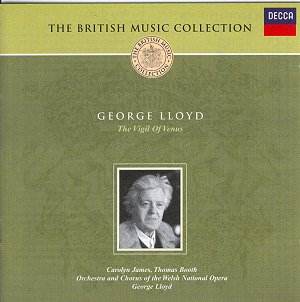This series is valuable not only for itself but because
it has also given Malcolm Southern the excuse to dust off recordings
first made just over a decade ago for Decca's Argo label. In the same
batch as this we also have Coleridge Taylor's Hiawatha trilogy
and the Constant Lambert collection with the BBC Concert Orchestra
- both recordings reanimated from Argo deletions.
George Lloyd's epic choral work fits onto a single
CD to perfection. It was written in the sunlight of a new confidence
borne of John Ogdon's support as well as the rising Manchester influence
of Edward Downes and Peter Marchbanks. The Vigil came about within
three years of the momentous evening broadcast of the Eighth Symphony.
I still recall listening during that sweltering summer and retain the
tape to this day. Lloyd was quickly embroiled in arrangements for BBC
broadcasts, Lyrita recordings of symphonies 4, 5 and 8 and the first
rumblings of support from Albany and Peter Kermani. At this point his
fecundity of production accelerated although tragically his ideas began
steadily to lose their oxygen. The Vigil of Venus caught Lloyd
still with the power to delight. He celebrates the joys, amatory and
celebratory, of the Northern spring felt from the perspective of a warm
Mediterranean heart. The vocal writing is exultant and curvaceous. The
brass passages are well communicated. There is a Puccinian exuberance
to these crowded pages which at times looks out towards William Mathias’s
contemporaneous This Worlde’s Joie. At other moments he picks
up on Holstian mysticism, Handelian chortling and the skipping open
air pleasures of Patrick Hadley’s The Hills. In the penultimate
of nine separately tracked episodes the music seems to be some weirdly
transformed tango supporting Straussian delights for the chorus. By
the most unforgiving of standards (those established by himself in the
mid-period symphonies) this work lacks indelibly memorable invention.
However Lloyd can and does rise to full euphoric stretch in the swinging
vernal march in the first and ninth episodes. There is much to exult
in along the way but I would not recommend this as the first Lloyd work
to try. For that you must seek out and choose from the Fourth, Fifth,
Sixth and Seventh Symphonies (all on Albany).
The work is sung in Latin and the words are provided
alongside the translation by Arthur Quiller-Couch (remember ‘Q’? Nothing
to do with ‘Star Trek’!).
Rob Barnett
See also review
by John France
NOTE FROM JOHN QUINN
I had some exposure to Lloyd's music back in the late
1970s/early 1980s when I was involved with Adrian Smith's Slaithwaite
Philharmonic.
We actually gave the second public performance of the
Sixth Symphony (the BBC Phil "pipped us to the post" by a matter of
months doing it at that year's Proms). George Lloyd attended the performance
(with his wife) and was very nice and most encouraging. As Secretary
of the orchestra I had to arrange his visit and, of course, I got to
meet him: he even apologised for not including any bassoon solos in
the work (I was secretly relieved he hadn't)
Adrian and I went down to Manchester before that a
couple of times for BBC studio concerts. It was this, plus broadcasts
and recordings that made Adrian keen to do some Lloyd (and he did it
very well). I remember Downes doing the Fourth (brilliantly) and Lloyd
himself doing November Journeys.
I entirely agree with your comments about Lloyd's compositional
quality declining as his exposure increased. I have to say that I've
never quite found my way into the Vigil (which I bought when Argo first
issued it) though I'm sure that's more my fault than Lloyd's and there
can be no doubting the lyrical impulse and colourful writing and scoring
of long passages.
I would certainly endorse your list of "key works"
though I think I might substitute the 8th symphony for the 7th. Obviously
I'm biased about the 6th for which I've retained a soft spot. What a
shame that, as with so much else from that catalogue (Parry's wonderful
Ode on the Nativity, for instance) the Lyrita Lloyd recordings seem
doomed never to appear on CD.
John Quinn

